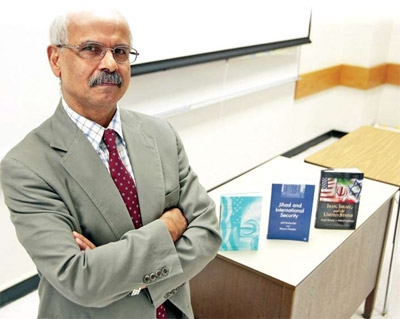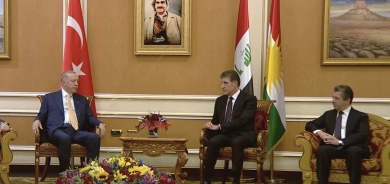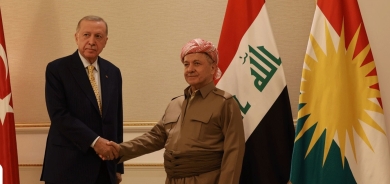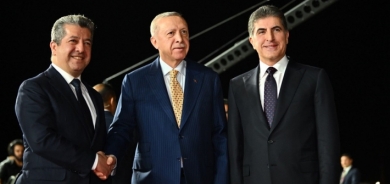Jalil Roshandel: the Iraqi government has failed because it did not include the forces that it had to
August 20, 2014
Exclusive Interviews

Roshandel: the situation is very regrettable because ISIS is cruel, ruthless group that is killing innocent, civilian people and also kill and abuse children. These army information and the pictures we can see on line, a lot of children saw have been recruited or abused by them and that is something humanity cannot take it easily and wisely. So I think the plan of action in alliance with internal and outside powers and also Iraqi neighbors are required to halt the situation and put an end to this aggression by this cruel group. However, if this situation continues, in addition to humanitarian disaster that is imposing to the neighborhood and to the Iraqi internal environment, as you mentioned for instance, the Kurdish provinces in Iraq, so it can cause both political, security and also environmental disaster to the nation of Iraq and also to the Middle East because, and we have seen, the crime of aggression is not limited to one district or one place or one location. They are going east and west, the sooner or later, the impact of these aggressions will affect Iraqi neighbors like Jordan, it already affected Syria, and most probably Iran, so therefore the disaster is not only limited to Kurdistan but also to neighboring areas of Iraq.
Gulan: US foreign secretary disclosed that what is happening in Iraq has nothing to do with the United States, which means United States will not be able to play a role in Iraq, while most of the experts think that this situation in Iraq is a result of withdrawal of US forces too soon in 2011, so in your opinion, don’t you think that the current United States’ position is simply running from the failure in Iraq?
Roshandel: as you mentioned the US withdrawal of forces, it starts in 2011 and completed in 2012, but the US presence in Iraq was by many people and scholars and international relation experts contested. A lot of people forced and pushed the US to withdraw and US president made that happen. In the meantime, it was waiting until Iraq has almost three years to consolidate its power to include all tribal groups, ethnic groups, linguistic group, and religious group in a form of a strong powerful government democratically elected and ruled. It is therefore, to my belief, the failure of the Iraqi government that has been excluding all possible forces from the structure of politics, so the Iraqi government has also failed because it did not include the forces that it had to. At this very point, the situation especially the withdrawal of US troops, it is hard for the US troops go back to the country they have already withdrawn from: first of all they have some structural problems, US president has to get approval of US congress in order to send troops back to Iraq, and that is not going to be an easy task because there are pros and cons for this purpose. It is therefore for the US, at least at the current circumstances, it is not going to be an easy task or even possible to send military troops back to Iraq, but US can help, assist the government, and the Iraqi government has a greater role to play by including, rather than excluding, different political views, leaderships, ethnic, religious, linguistic groups within the structure of Iraqi power.
Gulan: As Sunni Arabs took control of their territory, the Shiite Arbas, after Sistani’s fatwa, all carried guns. So a sectarian cleansing war is about to take place between Shiites and Sunnis, and the UN can do nothing and the international community seems silent, so to what extent is the risk of regional intervening in Iraq increasing towards a regional war inside Iraq using Iraqi ground as a battlefield?
Roshandel: this depends on how much the regional powers financially and militarily support ISIS because without external support the ISIS is unable to continue. It is now receiving sectarian support within Iraq but in the long term, even though it has done some relation and killing innocent people inside Iraqi territory, it would be hard for ISIL to maintain this position, but that means, like you mentioned, there is going to be a regional struggle between elements within Iraq and probably its neighboring countries and that bring a war, a regional war among different sectarian groups, religious groups, and also even secular groups. This is somehow unavoidable unless the Iraqi government pictures the structure of power by including those who are no right or not participation right now in the structure of power. You have had a very good election recently, a very democratically elected process, but it has to include, rather than exclude, all people.
Gulan: the fall of Mosul, which is the second largest city in Iraq, was really a surprising event. Now the concern is about whether Baghdad is going to be attacked by ISIL or not because the Sunnis have their own territories and Shiites take hold on their own places. So if Baghdad is going to be attacked by ISIL, to what extent will another Afghanistan story be repeated in Iraq?
Roshandel: I hope that will never happen and I hope that Iraq will not be divided into three sections; rather I wish Iraq will stay strong because strength is in unity. Dividing into different sections, three or more, means continuous war for the unseen and unpredictable future. But at this point, you totally need advices, tools, and means in order to defend the territory and to keep it united. In such cases, you need a strong leadership rather than necessarily strong arms because even ISIL can, within different circumstances and situations, negotiate. If it is constrained to Sunnis, Arabs, Shiites, and Kurds, then you cannot stop the situation to be worse than Afghanistan. As you know there have been wars in Afghanistan for forty years or even if you go back to the early twentieth century it was not almost quite stable, I hope this will never happen in Iraq. It would be a great disaster for the heritage of humanity that is inherits in your territory.
Gulan: by preserving the stability and prosperity in Kurdistan Region of Iraq, it will be a hope for the future of Iraq because it is a safe and stable part of Iraq and now is facing challenges from the central government in Iraq as Maliki has cut the Kurdish share of budget and as ISIL threatens the stability of the region. So to what extent will preserving peace and stability in KRG be a hope for the future of Iraq and be a point of concern at the international level?
Roshandel: peace, stability, and tranquility are preferable and they are possible. The Kurdish region in Iraq has been so far stable and has been able to defend its territory so far, but in order to remain peaceful circumstances and environment, you need to have peaceful neighborhood as well. You cannot remain peaceful for long, if right outside your border ISIS is fighting the Iraqi government and central government is fighting ISIS. I agree now Kurdistan represents more peaceful example within Iraq, but I also personally wish that the peaceful Kurdistan remains within a greater peaceful Iraq. As I have said before, power is in unity, not in divided territories. Peace and power and survivability depend on the unity among the nations.
Gulan: Iraq owns a huge oil and gas resources. How far will halting an Iraqi oil and gas exporting create crisis in the international energy market especially since currently Russia is unable to export oil due to economic sanctions. So to what extent, will violence in Iraq have impact on international energy market?
Roshandel: as you know, already even though the transportation of oil has not been halted yet, it will have some miner negative impact on the market. Any consumer in the US since the conflict erupted, it stays more of the top and I think it stays in the neighboring states of Iraq including Europe. So it has a burden on international community from the point of economy and that is probably not a major issue that international community has to think about. Unfortunately, the United Nation’s security council has so far not been so helpful basically because members of the security council have different interests or internally they are divided like the way, for instance, Russia, somehow, weak alliance with the rest of the members of the security council and itself under sanction. So we need more powerful actions from the international community in order to stop those economic hardships that are underway and also a disaster that is for sure going to happen sooner or later, if ISIS not destroyed.
AS a scholar who is concerned about the Middle East and originally from the Middle East, I always wish peace and stability because in developed countries also bring peace and stability while we are spending our resources on wars and regional wars and killing innocent people, then it will be nothing left to keep as countless so I think even the leaders of ISIS have to think about it, they may think idealistically ok we will go fight and then change the circumstances and bring prosperity. They have been unable to do that in any previous context. So the wars continue at the expense of poor people who are suffering from any point of view. I think it is time to think differently and think that war is not a response, it is not an answer, and look for peace, friendship, and know each other.















